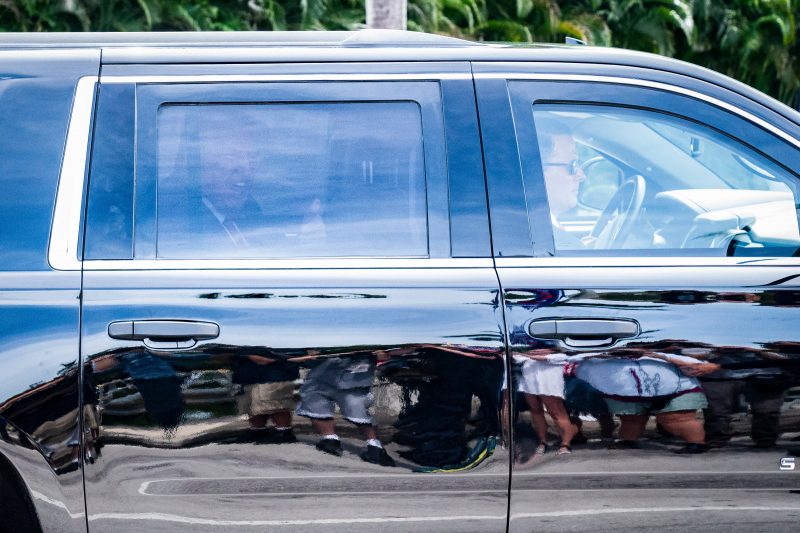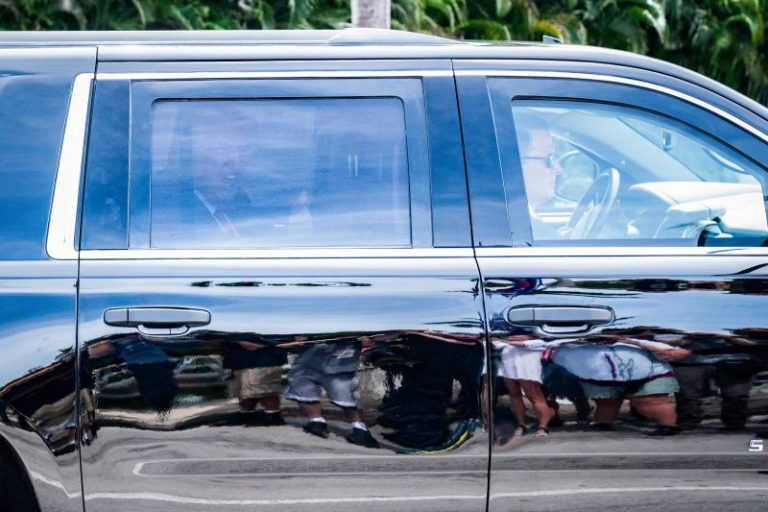
MIAMI — Former president Donald Trump awaited his first scheduled court appearance to face federal criminal charges here Tuesday while authorities pledged to keep their city safe despite potentially large crowds surrounding the event.
The logistical and security planning ahead of the hearing underscored the unprecedented nature of Trump’s court appearance — no ex-president has ever been a defendant in a federal criminal case — along with the uncertainty about what might unfold on Tuesday. Trump and his supporters have called for demonstrations opposing the case, with some of his acolytes sometimes using violent rhetoric in denouncing the charges.
In Miami, local leaders have vowed to be ready for anything, saying they were prepared for crowds of anywhere from 5,000 to 50,000 people, though no official specifically predicted such a sizable group would actually appear. Miami Mayor Francis Suarez, a Republican, said Monday that law enforcement officials in the city were deeply experienced in dealing with large protests and called on people who gather to remain peaceful.
“We obviously believe in the Constitution, believe that people should have the right to express themselves,” Suarez said at a news briefing. “But we also believe in law and order.”
Trump was charged last week with more than three dozen counts related to his handling of classified documents since losing the presidency. In a blistering indictment filed in South Florida and unsealed Friday, he was accused of hoarding sensitive intelligence information after leaving office and then obstructing federal officials investigating the matter.
Trump has railed against the charges, denied any wrongdoing and repeatedly denigrated the law enforcement officials investigating him in this and other cases around the country.
One of his aides, Walt Nauta, was also charged in the case. Both Trump and Nauta were ordered to make their initial appearances in the gleaming Wilkie D. Ferguson Jr. Courthouse in downtown Miami at 3 p.m. on Tuesday.
The case has brought an unexpected burst of Trump-centric attention to Miami, a waterfront city hugging Biscayne Bay. While otherwise in the national news for positive developments — the Miami Heat recently reached the NBA Finals, hosting games just minutes from the federal courthouse — Trump’s court hearing carries with it instead the potential for tumult spilling onto the city’s streets.
“We’re taking this very seriously,” Suarez said at the news briefing. “And we are prepared for what will happen.”
Suarez pointed to the city’s experience with the demonstrations that unfolded there and nationwide after a White police officer in Minneapolis killed George Floyd, a Black man, in 2020.
Suarez, who has hinted that he is weighing seeking the Republican nomination for president against Trump next year, said he had not spoken to the former president and declined to discuss the indictment during his briefing on Monday. Suarez instead referred to Trump’s court appearance and potential protests around it as an upcoming “event in downtown Miami.”
Miami officials have suggested they want all hands available on Tuesday, according to internal emails viewed by The Washington Post, telling police officers they cannot take the day off and ordering plainclothes detectives to wear uniforms in case they need to be deployed onto the city’s streets.
Local police have also disseminated advisories noting that rallies were being planned for near the courthouse, including one ostensibly organized by the Miami chapter of the far-right Proud Boys group, according to a law enforcement bulletin.
Laura Loomer, a right-wing provocateur who once handcuffed herself to Twitter’s New York City headquarters, said she was planning a “peaceful rally” on Tuesday at noon outside the federal courthouse.
“Everyone attending understands this is a peaceful, nonviolent demonstration,” she said.
Trump has also called for protests, including during a radio interview on Sunday with Roger Stone, his longtime adviser, who encouraged demonstrators to remain peaceful as well.
But some rhetoric online and offline has alluded to violence. Kari Lake, who lost her Trump-endorsed bid to become Arizona’s governor last year, said she plans to rally to support Trump in South Florida. While responding to the federal charges, she bluntly invoked how many of his supporters owned guns.
“If you want to get to President Trump, you’re going to have to go through me and you’re going to have to go through 75 million Americans just like me,” she told a GOP group Friday. Referencing the National Rifle Association, she added: “Most of us are card-carrying members of the NRA. That’s not a threat, that’s a public service announcement.”
Trump’s first court date as a federal defendant carries with it a host of questions, including how the case might play out and what if any impact it might have on his ongoing bid to reclaim the White House in 2024. But the first question that will be answered is what will happen when Trump actually appears in federal court, and whether large-scale demonstrations follow.
Since the indictment was revealed, law enforcement officials in Miami have been monitoring social media calls for protests and other events. Manuel Morales, the Miami police chief, said that while there had been many posts online, he added that none of them appeared to be credible enough to cause concern. But he also acknowledged that things could always go awry.
“We know that there’s a potential of things taking a turn for the worse,” Morales said while appearing alongside Suarez on Monday. “But that’s not the Miami way.”
Morales has said local, state and federal officials would have a “comprehensive” response to allow people to demonstrate but maintain peace in Miami. He said authorities would make decisions regarding street closures depending on the size of crowds and mentioned the importance of keeping opposing sides apart.
The crowd size on Tuesday could also be affected by South Florida’s sometimes unforgiving elements, including stifling heat and regular afternoon downpours that are summer staples across the area.
On Monday, the security presence outside the courthouse became more noticeable. Federal officers roamed a surrounding plaza and monitored a line of journalists that began forming late in the morning to claim spots in the hearing the following day. A growing number of television news crews set up tents along nearby North Miami Avenue, claiming territory in advance of Tuesday’s live broadcasts. Still, the area was not entirely taken over by the news media: At one point in the afternoon, a lone rooster wandered around a large open space in the court plaza.
Trump has appeared in a courtroom once this year as a criminal defendant, when he was charged in Manhattan in connection with a hush money payment made to an adult-film actress who had alleged having an affair with him years earlier. When he was arraigned on state charges in Manhattan in early April, Trump supporters and opponents alike gathered outside, along with casual observers and a large crowd of journalists. Trump pleaded not guilty in that case.
He is also facing ongoing investigations in connection with the Jan. 6, 2021, Capitol riot, and a separate probe into efforts by Trump and his allies to overturn Joe Biden’s presidential win in Georgia in the 2020 vote. Trump has denied all wrongdoing and said those investigating him are politically biased. In one social media posting, he called Jack Smith, the special counsel leading the classified documents case, “a deranged ‘psycho.’”
Ongoing investigations involving Donald Trump
1/7
End of carousel
Trump had been in New Jersey at one of his golf resorts before heading to Doral, Fla., on Monday. The city is home to the Trump National Doral, another of his golf resort properties, which is about 12 miles west of the courthouse.
Before his arrival in Doral, a couple of dozen supporters gathered on the sidewalk across the street from his club, chanting: “Trump is innocent! Trump is innocent!”
About 50 supporters who had waited for hours caught a glimpse of Trump just before 3:20 p.m. Monday. As he passed by in a black Chevy Suburban, they saw him flashing a thumbs-up.
“We love Trump!” one woman chanted. “We love Trump!”
Trump was expected to stay in Doral overnight before going to court Tuesday, according to two people familiar with his plans who spoke on the condition of anonymity because they were not cleared to speak publicly.
He is expected to arrive downtown at about 2 p.m. Tuesday, according to an internal email sent by the chief judge of Miami-Dade’s state courts system. The email was sent to local judges in two nearby state courthouses, to help them prepare for potentially large crowds and any traffic headaches. Chief judges in Florida have administrative authority over state courts within their judicial circuits, which are separate from the federal court system in which Trump is being charged.
Judges and supervisors were being given discretion to allow employees to work remotely, Chief Judge Nushin Sayfie wrote in her email. Also, no jurors or potential jurors will be required to go to the civil or family courthouses Tuesday, and some ongoing trials might be delayed or moved.
Trump’s trip to Florida was expected to be brief, with aides saying he plans to make public remarks Tuesday night back at his New Jersey club.
The short trip to appear in court and a return to his home turf to deliver a speech followed a pattern set in Trump’s indictment this year in Manhattan. After he was arraigned there, Trump returned to his Mar-a-Lago estate in Palm Beach, which has been his primary residence since leaving office, to deliver a speech criticizing that prosecution.
Paquette reported from Doral, Fla., and Berman reported from Washington. Shayna Jacobs in Miami and Carol D. Leonnig and Isaac Arnsdorf in Washington contributed to this report.


Comments are closed.